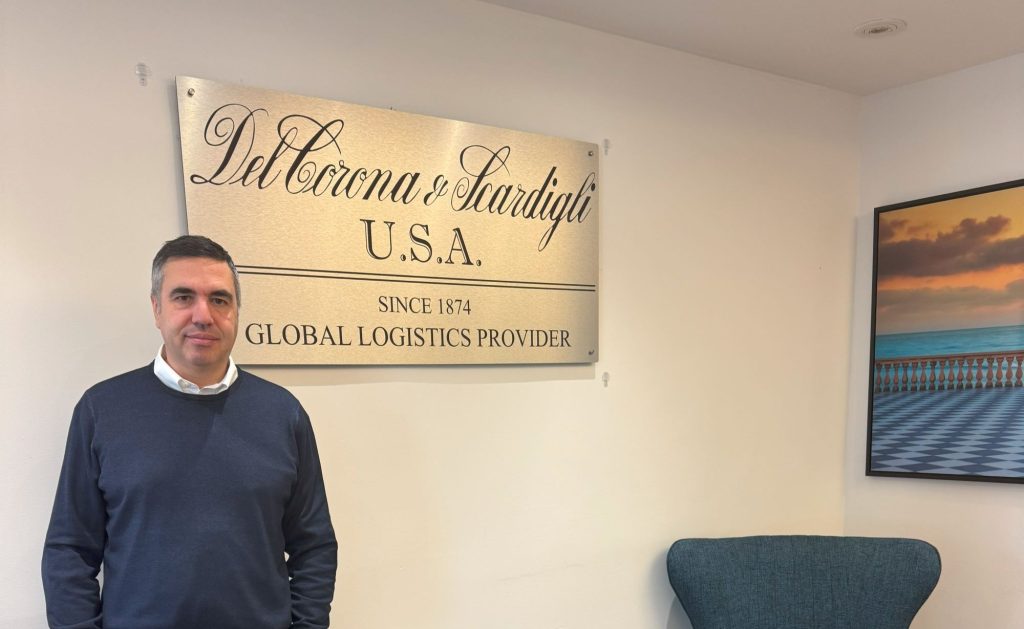Del Corona & Scardigli (DCS) is one of the leading freight forwarders of Italian goods to the United States. The company was founded in 2001, but its roots run much deeper: Umberto Del Corona was established in 1874, and Fratelli Scardigli in 1946.
In recent years, the logistics world has become a true battleground: first came the chaos of supply chains during the pandemic, then geopolitical tensions, and now the uncertainty brought by Trump’s new trade policies. With his potential return to the White House, the risk of new tariffs and trade barriers is already unsettling global markets.
Stefano D’Angelo, CEO of DCS, spoke with us about how his company has faced these challenges, his vision for the future of logistics, and how new technologies—including artificial intelligence—are reshaping the industry.
How was DCS founded and how did you enter the family business?
The idea was clear: we wanted to help companies grow by giving them the tools to move confidently through international markets.
Being a family business isn’t just about carrying a historic name. It’s something deeper: it means carrying on values and traditions, and maintaining relationships built on long-term trust. This has always allowed us to adapt quickly and grow steadily. We know we have a great responsibility toward our employees, many of whom have been with us for years and are truly the heart of the company.
“I grew up inside DCS, learning directly from my father Fulvio and from Luigi Del Corona—two true masters of the industry. They taught me the importance of dedication, high-quality service, and trust with clients.”
At first, I wasn’t sure this would be my path, but over time I realized how deeply DCS was part of me and my family. I chose to step up and carry forward what they had built, but with an eye on the future and the new challenges of the market.
Why did you decide to expand into the United States?
Opening in the U.S. was almost a natural step—but also a big dream. If you’re in international logistics, you can’t ignore the American market: it’s vast, competitive, and full of opportunities for those who can stand out.
We were fortunate to help many Italian companies enter the American market, supporting them in their growth and expansion. We’re not just service providers—we consider ourselves strategic partners for our clients. Looking at where we are today, we know we made the right choice.
“Our American dream was exactly this: to grow while staying true to our Italian roots, and become a reference point for trade between Italy and the United States.”
What impact did COVID have on your business?
COVID turned the logistics industry upside down, but for us, it meant a boom in business. Between 2021 and 2022, with people stuck at home, unable to travel or dine out, demand for physical goods skyrocketed. This drove up shipping volumes and logistics costs, pushing our global revenue to one billion dollars.
In 2023, however, the market began to stabilize. After the pandemic peak, volumes returned to more sustainable levels and prices began to ease. For us, it was a phase of recalibration: we’re still growing, but without the frenetic pace of those two years. From a broader economic perspective, it’s a good thing that prices stabilized—logistics-driven inflation was tough on everyone.
Trump has announced new tariffs on imports. What consequences will this have for the sector?
I don’t agree with this policy. Tariffs can trigger a chain reaction: if the U.S. imposes duties on European imports, the affected countries will do the same with American goods. It’s a trade war that benefits no one.
Also, tariffs mean higher prices for consumers. Take a simple example: olive oil. The U.S. doesn’t produce it in sufficient quantities, so it imports it. Add a 10% tariff, and the retail price goes up by 10%. Who loses? The American consumer. And the same applies to countless other products.
For us, this could have a direct impact: if clients find it harder to sell their products in the U.S., they may shift to other markets, reducing import volumes. We’ll have to be ready to respond and adapt to this scenario.
Artificial intelligence is transforming the logistics industry. What do you expect for the future?
AI is revolutionizing the sector, and the change will be massive. On one hand, it will improve efficiency and reduce errors in administrative processes. On the other hand, many operational roles might disappear.
Clients still want to talk to a person—not a bot. And the trust built through good service can’t be automated.
In the next ten years, we’ll see increasingly tech-driven logistics, but those who know how to balance innovation with human relationships will be the ones to succeed.
“However, there’s one thing technology will never replace: the human connection.”
Today, DCS is a growing player in the American market…
Over the last 13 years, Del Corona & Scardigli has played a key role in expanding major Italian brands in the United States, solidifying its position in international logistics.
Since 2011, the company’s U.S. branch has grown exponentially—from $10 million in revenue to over $220 million in 2024, with 120 employees, 7 offices, and 4 distribution warehouses.
Despite uncertainties tied to new economic policies and the challenges of global trade, DCS continues to invest in the future, strengthening its role as a key player in Italian exports to the United States.
The goal is to remain a cornerstone of transatlantic trade, facing market changes and seizing the opportunities brought by digitalization.

